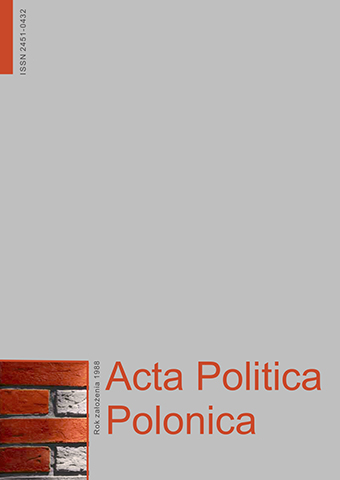
ISSN: 2451-0432
OAI
DOI: 10.18276/ap.2018.43-05




Lista wydań /
1/2018 (43)
Referendum ogólnokrajowe w Słowacji – nieudany eksperyment
| Autorzy: |
Elżbieta
Kużelewska
Uniwersytet w Białymstoku, Wydział Prawa |
| Słowa kluczowe: | referendum głosowanie partycypacja społeczna Słowacja |
| Data publikacji całości: | 2018-03-30 |
| Liczba stron: | 9 (51-59) |
| Klasyfikacja JEL: | Z19 |
Abstrakt
Celem artykułu jest prawna analiza instytucji referendum ogólnokrajowego w Słowacji
oraz omówienie konsekwencji jego przeprowadzania. Ze względu na liczne referenda ogólnokrajowe
(osiem głosowań, 18 zagadnień poddanych pod głosowanie) Słowacja jest pod
tym względem liderem wśród państw Europy Środkowej. Niemniej analiza okoliczności
rozpisywania referendów, podmiotu zarządzającego oraz postawy społeczeństwa i wyników
pozwalają na sformułowanie tezy, iż częstotliwość pytania o zdanie narodu nie koresponduje
z ideą tego narzędzia demokracji bezpośredniej i referendum traktowane jest
przez elity polityczne instrumentalnie.
Pobierz plik
Plik artykułu
Bibliografia
| 1. | Bebler, A.A. (red.) (1999). The Challenge of NATO Enlargement. Westport: Praeger. |
| 2. | Deegan-Krause, K. (2006). Elected Affinities. Democracy and Party Competition in Slovakia and the Czech Republic. Stanford: Stanford University Press. |
| 3. | European Court of Human Rights (2010). Case of Schalk and Kopf v. Austria. (Application no. 30141/04). Strasbourg. |
| 4. | Forest, M. (2017). Europeanizing versus Nationalizing the Issue of Same-Sex Marriage in Central Europe. A Comparative Analysis of Framing Processes in Croatia, Hungary, Slovakia, and Slovenia. W: B. Winter, M. Forest, R. Sénac (red.), Global Perspectives on Same-Sex Marriage. A Neo-Institutional Approach (s. 127–148). Basingstoke: Palgrave Macmillan. |
| 5. | Hacker, P. (2010). Slovakia on the Road to Independence. An American Diplomat’s Eyewitness Account. Pennsylvania: The Pennsylvania State University Press. |
| 6. | Henderson, K. (2003). Referendum Briefing No 7. The Slovak EU Accession Referendum 16–17 May 2003. Pobrane z: https://www.sussex.ac.uk/webteam/gateway/file.php?name=epern-ref-no-7.pdf&site=266 (30.10.2017). |
| 7. | Horwáth, P, Brix, R. Direct Presidential Election as an Attendant Feature of Central European Consolidation. Pobrane z: http://paperroom.ipsa.org/papers/paper_35813.pdf (30.10.2017). |
| 8. | Konstytucja Republiki Słowackiej (2003), Warszawa: Wydawnictwo Sejmowe. |
| 9. | Kopeček, L., Belko, M. (2003). Referendum in Theory and Practice: the History of the Slovak Referendums and Their Consequences. Central European Political Studies Review, 2–3 (5), 193–201. |
| 10. | Krošlák, D. (2015). The Referendum on the so-called Traditional Family in the Slovak Republic. Central and Eastern European Legal Studies, 1, 149–167. |
| 11. | Krzywoszyński, P. (2014). Voting in a Pluralistic World. Some Democratic Paradoxes Concerning Referendums. W: D Díaz-Soto, D. Manzanero, B. Thoilliez, (red.), Philosophical Challenges of Plurality in a Global World (s. 55–65). Cambridge: Cambridge Scholars Publishing. |
| 12. | Kużelewska, E. (2014). Referendum in the Czech Republic and Slovakia. Annales UMCS Sectio K: Politologia, 1 (21), 97–110. |
| 13. | Kużelewska, E. (2015). How Far Can Citizens Influence the Decision-Making Process? Analysis of the Effectiveness of Referenda in the Czech Republic, Slovakia and Hungary in 1989–2015. Baltic Journal of European Studies, 2 (5), 171–196. |
| 14. | Láštic, E. (2011). Slovakia – Restricted Direct Democracy in Local Politics. W: T. Schiller, (red.), Local Direct Democracy in Europe (s. 237–244). Heidelberg: VS Verlag. |
| 15. | Mesežnikov, G. (2015). Slovakia: Causes of the Referendum Fiasco. Pobrane z: http://cz.boell.org/en/2015/02/12/slovakia-causes-referendum-fiasco (3.12.2017). |
| 16. | Moormann-Kimáková, B. (2016). Slovakia. W: A. Fruhstorfer, M. Hein (red.), Constitutional Politics in Central and Eastern Europe. From Post-Socialist Transition to the Reform of Political Systems (s. 65–100). Wiesbaden: Springer. |
| 17. | Pavasović Trošt, Slootmaeckers, K. (2015). Religion, Homosexuality and Nationalism in Western Balkans: The Role of Religious Institutions in Defining the Nation. W: S. Sremac, R.R. Ganzevoort. (red.), Religious and Sexual Nationalisms in Central and Eastern Europe. Gods, Gays and Governments (s. 154–180). Leiden–Boston: Vrije Universiteit Amsterdam. |
| 18. | Podolak, M. (2014). Instytucja referendum w wybranych państwach Europy Środkowej i Wschodniej (1989–2012). Lublin: Wydawnictwo UMCS. |
| 19. | Referendá (2016). Štatistický úrad SR. Pobrane z: https://slovak.statistics.sk/wps/portal/ext/themes/elections/referendums/ |
| 20. | about/!ut/p/z1/pZHLDoIwEEU_qUNboCwLCpSgvB_OxrAyJIoujN8vIIkriomza-ac9s6UIGkJDt2rv3TP_ |
| 21. | j501_F8Qutcx6lwXUMCFAcHVF3wMhE2jZhNmhnIbPUBxDHfgyplGuQRN4CbBMe2X6RUOjzwdnnij22Pi |
| 22. | iK2KICx-BoA1983U7r4XiBDbscAIg5MUDKscidjDCTT-d_8sFISfvM1Af_xJwD18RqCM6LbwNYduPVJqJu- |
| 23. | ChVQPTFt43KqpWuhV_wZB-IB9/dz/d5/L2dBISEvZ0FBIS9nQSEh/ (8.11.2017). |
| 24. | Rybar, M., Sovcikova, A. (2016). The 2015 Referendum in Slovakia. East European Quarterly 1–2 (44), 79–88. |
| 25. | Rytel-Warzocha, A. (2011). Referendum ogólnokrajowe w państwach Europy Środkowo-Wschodniej. Warszawa: Wydawnictwo Sejmowe. |
| 26. | Schwegler, B.A. (2008). Confronting the Devil. Europe, Nationalism, and Municipal Governance in Slovakia. Chicago: BiblioBazaar. |
| 27. | Zákon (2014). Zákon z 29. mája 2014 o podmienkach výkonu volebného práva a o zmene a doplnení niektorých zákonov. Zákon č. 180/2014 Z. z. Pobrane z: http://www.zakonypreludi.sk/zz/2014-180 (3.12.2017). |
| 28. | Zieliński, E. (2003). Referendum w Czechach, Słowacji, Słowenii. W: E. Zieliński, I. Bokszczanin, J. Zieliński (red.), Referendum w państwach Europy (s. 55–80). Warszawa: Aspra-JR. |
| 29. | Żarna, K. (2010). Między Wschodem a Zachodem. Słowacja a Sojusz Północnoatlantycki (1993–2004). Polityka i Społeczeństwo, 7, 212–230. |